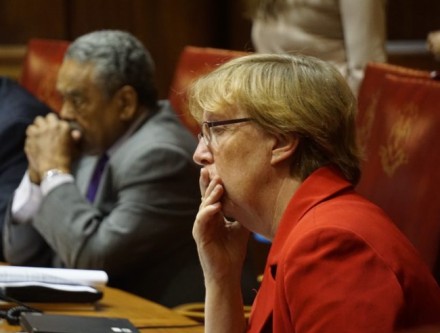
With Senators Marilyn Moore and Ed Gomes voting yes, the State Senate early Wednesday morning approved development of Connecticut’s first casino off tribal land in East Windsor operated by a joint venture of the Mashantucket Pequot and Mohegan tribes to counter MGM Resorts International’s nearly $1 billion casino operation in Springfield, Massachusetts. The bill now moves to the State House with just two weeks left in the legislative session. The vote was 24-12.
MGM officials and lobbyists argue that the better way to go is an open, competitive process for a third casino in southwestern Connecticut to galvanize the wealthy Fairfield County and New York markets. They contend amidst a state budget crisis more dough will flow to the state through a competitive process.
“I think in the middle of a budget crisis, the Senate just took a step to give away a privileged license worth over $100 million,” Uri Clinton, a senior vice president and legal counsel of MGM Resorts told the CT Mirror. “I think there are people who are very smart in the House who understand the budget crisis. I think as it becomes part of the budget debate, additional options might show up.”
Another making that argument is Richard Velky, chief of Kent-based Schagticoke Tribe, who says a southwestern Connecticut casino would dwarf the revenue of a smaller casino in East Windsor and current money the state receives from the tribal nations. The Schagticokes do not have federal recognition.
About 25 years ago Connecticut entered into a gaming monopoly agreement in which it receives 25 percent of the slot take from the tribal nation casinos. A new commercial casino not run by the tribal nations breaks the compact. But one potential legal sticking point is the location of the East Windsor site not on tribal soil. Attorney General George Jepsen said he has some legal concerns that could invalidate the compact.
MGM will continue to press its case to protect its gaming turf both in public posturing and legal remedy.
In backing the bill, Moore and Gomes cite the revenue stream that has benefited Bridgeport from the gaming compact. In the early years of the gaming compact crafted under then-Governor Lowell Weicker Bridgeport received upwards of $10 million per year. The latest figure is about $6 million as slot revenues from the casinos have diminished in recent years. They also cite the jobs the state will retain with a third casino upstate to offset the Springfield operation.
This is the time of the legislative session that produces a long day’s journey into the night. The state still has not enacted a budget that determines the flow of dollars to municipalities.


This is all fine and dandy! Bridgeport needs some slot candy at Shoreline Star!!
I hope that our two state senators will support an amendment if it is attached to the House Bill authorizing slots at the Bridgeport parimutuel..
It could be a Shore Thing.